As you get less sleep, it’s tempting to reach for an energy or caffeinated drink to stay awake during the day. Believe it or not, consuming these types of drinks to combat sleepiness, can lead to a vicious cycle.
Yes, caffeine will help you stay awake, but it can easily take up to eight hours to wear off. This means it can also reduce your sleep time and decrease the quality of your sleep.
So, how do can you stay awake naturally?
In one well-known study, Robert Thayer, PhD, a professor at California State University, Long Beach, studied whether people were more energized by eating a candy bar or taking a brisk 10-minute walk.
Though the candy bar provided a quick energy boost, participants were actually more tired and had less energy an hour later. The 10-minute walk increased energy for two hours. That’s because walking pumps oxygen through your veins, brain, and muscles.
If you work at a desk, get up frequently for short walks. At meal breaks, walk to a restaurant or, if you bring your lunch, head for a nice spot to eat it. Whether you take a walk outside or just in the building where you work, it will make you feel more alert and refreshed.
There are two things to remember about naps: Don’t take more than one and don’t take it too close to your bedtime.
“Nap between five and 25 minutes,” says Barry Krakow, MD, author of Sound Sleep, Sound Mind: Seven Keys to Sleeping Through the Night. It’s best to nap about six or seven hours before you would normally go to bed. If you must take a late nap close to bedtime, make it a short one.
Napping on the job can be touchy. If you need to nap at work, do it during your break and use a vibrating alarm clock, if necessary, to make sure it doesn’t spill over into your work time.
Sleeping at your desk is usually not a good idea, but many companies now provide nap rooms for employees.
“If you can’t nap, even resting quietly with your eyes closed for 10 minutes or so will help,” says Allison T. Siebern, PhD, a fellow at the Stanford University Sleep Medicine Center in Redwood City, Calif.
Continuous fixation on a computer screen can cause eyestrain and worsen sleepiness and fatigue.
Look away from the screen for a few minutes periodically to relax your eyes.
Sugary snacks give you a quick energy boost followed by the sugar “lows,” when low blood sugar produces mental fogginess and lethargy.
Snacks such as these will provide better overall energy in the long run:
If you’re fading fast, engaging in conversation can get your mind moving again.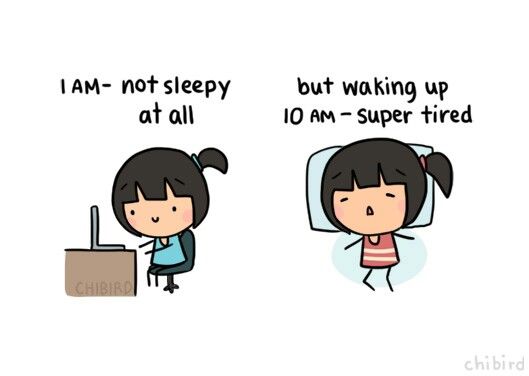 “Talk to a colleague about a business idea, politics, or religion,” says Krakow, medical director of Maimonides Sleep Arts and Sciences, Ltd. in Albuquerque, N.M. “It’s a very strong behavioral stimulator — especially when it’s a conversation about politics.”
“Talk to a colleague about a business idea, politics, or religion,” says Krakow, medical director of Maimonides Sleep Arts and Sciences, Ltd. in Albuquerque, N.M. “It’s a very strong behavioral stimulator — especially when it’s a conversation about politics.”
Environments with dim lighting aggravate fatigue. Studies have shown that exposure to bright light can reduce sleepiness and increase alertness. Try increasing the intensity of your light source at work.
Deep breathing raises blood oxygen levels in the body. This slows your heart rate, lowers blood pressure, and improves circulation, ultimately aiding mental performance and energy.
The idea of deep-breathing exercises is to inhale to the abdomen, not the chest. You can do them at your desk. Sitting up straight, try this exercise up to 10 times:
 Your chest should not move.
Your chest should not move. Another technique, called stimulating breath, is used in yoga for a quick energy boost and increased alertness:
“Driving while sleepy is as dangerous as driving under the influence of alcohol,” says Siebern. Common tricks such as opening the windows and turning on loud music won’t keep you awake for very long behind the wheel. “Have someone else drive or pull off the road and take a nap until you’re no longer sleepy,” Siebern says.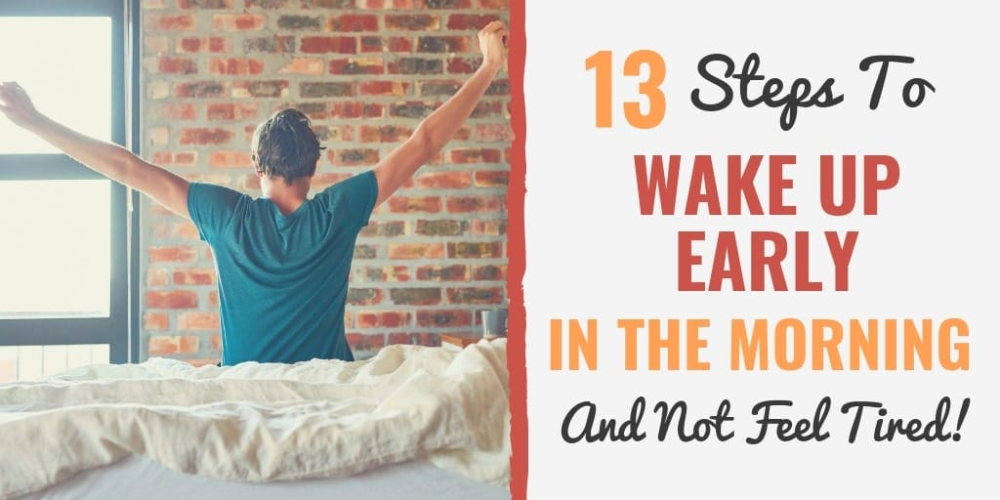
If you’re on an extended trip, change drivers often. Stop at least every two hours to take a walk and get some fresh air.
In 2004 Finnish researchers who studied people working 12-hour night shifts found that monotonous work is as harmful as sleep loss for alertness.
At work or home, try to reserve more stimulating tasks for your sleepy times. Or switch to more engaging work responsibilities when you feel yourself nodding off.
Dehydration can cause fatigue. Make sure you drink plenty of fluids and eat foods high in water such as fruits and vegetables.
Our circadian rhythms, which regulate our sleep-wake cycle, are influenced by daylight. Try to spend at least 30 minutes a day outside in natural sunlight. (Sleep experts recommend an hour of morning sunlight a day if you have insomnia. ) Even a step outside for a breath of fresh air will revive your senses.
) Even a step outside for a breath of fresh air will revive your senses.
In a 2006 analysis of 70 studies involving more than 6,800 people, University of Georgia researchers found that exercise was more effective in increasing energy and reducing daytime fatigue than some medications used to treat sleep problems.
Regular exercise also improves quality of sleep. Try to exercise 30 minutes a day.
If you decide to exercise hard some days, your energy level may drop for a bit and then surge for a few hours.
Eating a meal that contains both protein and carbohydrates within two hours after a heavy workout will lessen the initial energy loss. Be sure to finish your workout a few hours before bedtime so you are not energized when you try to sleep.
The team at Salem Health is here for you. Call our Sleep Center providers today!
Written by Camille Peri
With more and more of us getting less and less sleep, it’s tempting to reach for an energy drink or an espresso when we feel sleepy at work. But consuming caffeine to combat sleepiness can lead to a vicious cycle.
But consuming caffeine to combat sleepiness can lead to a vicious cycle.
The java jolt that helps you stay awake can take up to eight hours to wear off. Caffeine can also reduce your sleep time, alter the normal stages of sleep, and decrease the quality of your sleep.
How can you stay awake naturally? The most obvious thing is to get enough sleep and practice good sleep habits, sometimes called "sleep hygiene." For instance, you probably know that it's best to go to sleep ad get up at the same time every day, power down your screens ahead of bedtime, keep your bedroom dark and cool. You need to do that for good health, as well as feeling rested. But on the occasional day when that doesn't happen, try some of these 12 jitter-free tips to take the edge off sleepiness.
In one well-known study, Robert Thayer, PhD, a professor at California State University, Long Beach, studied whether people were more energized by eating a candy bar or taking a brisk 10-minute walk.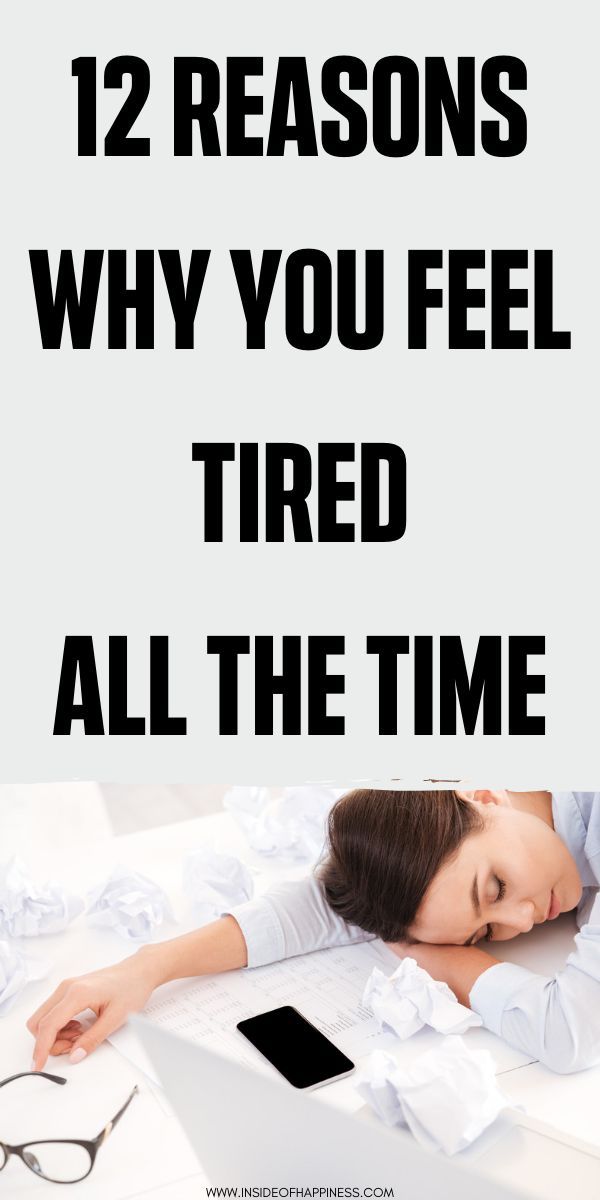 Though the candy bar provided a quick energy boost, participants were actually more tired and had less energy an hour later. The 10-minute walk increased energy for two hours. That’s because walking pumps oxygen through your veins, brain, and muscles.
Though the candy bar provided a quick energy boost, participants were actually more tired and had less energy an hour later. The 10-minute walk increased energy for two hours. That’s because walking pumps oxygen through your veins, brain, and muscles.
If you work at a desk, get up frequently for short walks. At meal breaks, walk to a restaurant or, if you bring your lunch, head for a nice spot to eat it. Whether you take a walk outside or just in the building where you work, it will make you feel more alert and refreshed.
There are two things to remember about naps: Don’t take more than one and don’t take it too close to your bedtime. “Nap between five and 25 minutes,” says Barry Krakow, MD, author of Sound Sleep, Sound Mind: Seven Keys to Sleeping Through the Night. It’s best to nap about six or seven hours before you would normally go to bed. If you must take a late nap close to bedtime, make it a short one.
Napping on the job can be touchy. If you need to nap at work, do it during your break and use a vibrating alarm clock, if necessary, to make sure it doesn’t spill over into your work time. Sleeping at your desk is usually not a good idea, but many companies now provide nap rooms for employees.
If you need to nap at work, do it during your break and use a vibrating alarm clock, if necessary, to make sure it doesn’t spill over into your work time. Sleeping at your desk is usually not a good idea, but many companies now provide nap rooms for employees.
“If you can’t nap, even resting quietly with your eyes closed for 10 minutes or so will help,” says Allison T. Siebern, PhD, a fellow at the Stanford University Sleep Medicine Center in Redwood City, Calif.
Continuous fixation on a computer screen can cause eyestrain and worsen sleepiness and fatigue. Look away from the screen for a few minutes periodically to relax your eyes.
Sugary snacks give you a quick energy boost followed by the sugar “lows,” when low blood sugar produces mental fogginess and lethargy. Snacks such as these will provide better overall energy in the long run:
 Start a Conversation to Wake Up Your Mind
Start a Conversation to Wake Up Your MindIf you’re fading fast, engaging in conversation can get your mind moving again. “Talk to a colleague about a business idea, politics, or religion,” says Krakow, medical director of Maimonides Sleep Arts and Sciences, Ltd. in Albuquerque, N.M. “It’s a very strong behavioral stimulator -- especially when it’s a conversation about politics.”
Environments with dim lighting aggravate fatigue. Studies have shown that exposure to bright light can reduce sleepiness and increase alertness. Try increasing the intensity of your light source at work.
Deep breathing raises blood oxygen levels in the body. This slows your heart rate, lowers blood pressure, and improves circulation, ultimately aiding mental performance and energy.
The idea of deep-breathing exercises is to inhale to the abdomen, not the chest. You can do them at your desk. Sitting up straight, try this exercise up to 10 times:
 Your chest should not move.
Your chest should not move.Another technique, called stimulating breath, is used in yoga for a quick energy boost and increased alertness: Inhale and exhale rapidly through your nose, keeping your mouth closed but relaxed. Make your in-and-out breaths short -- do about three of each cycle in a second. Then breathe normally. You can do this for up to 15 seconds the first time and then add on five seconds each time after until you reach a minute.
“Driving while sleepy is as dangerous as driving under the influence of alcohol,” says Siebern. Common tricks such as opening the windows and turning on loud music won’t keep you awake for very long behind the wheel. “Have someone else drive or pull off the road and take a nap until you’re no longer sleepy,” Siebern says.
If you’re on an extended trip, change drivers often. Stop at least every two hours to take a walk and get some fresh air.
Stop at least every two hours to take a walk and get some fresh air.
In 2004 Finnish researchers who studied people working 12-hour night shifts found that monotonous work is as harmful as sleep loss for alertness. At work or home, try to reserve more stimulating tasks for your sleepy times. Or switch to more engaging work responsibilities when you feel yourself nodding off.
Dehydration can cause fatigue. Make sure you drink plenty of fluids and eat foods high in water such as fruits and vegetables.
Our circadian rhythms, which regulate our sleep-wake cycle, are influenced by daylight. Try to spend at least 30 minutes a day outside in natural sunlight. (Sleep experts recommend an hour of morning sunlight a day if you have insomnia.) Even a step outside for a breath of fresh air will revive your senses.
In an analysis of 70 studies involving more than 6,800 people, University of Georgia researchers found that exercise was more effective in increasing energy and reducing daytime fatigue than some medications used to treat sleep problems.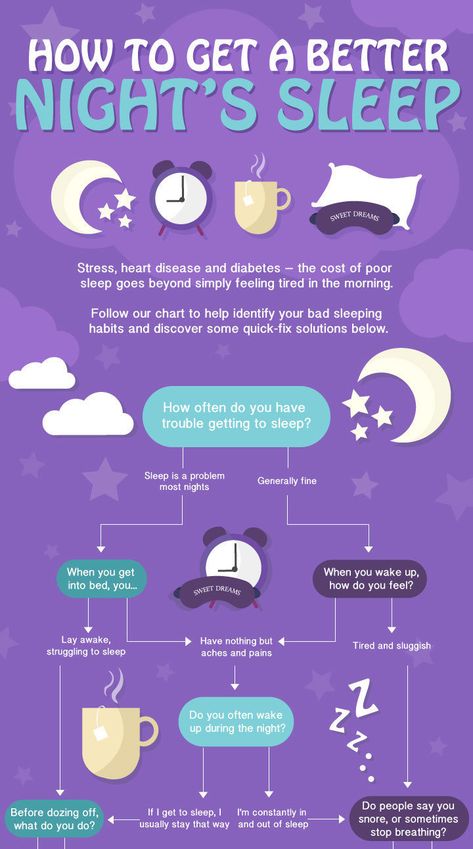 Regular exercise also improves quality of sleep.
Regular exercise also improves quality of sleep.
Try to exercise 30 minutes a day. If you decide to exercise hard some days, your energy level may drop for a bit and then surge for a few hours. Eating a meal that contains both protein and carbohydrates within two hours after a heavy workout will lessen the initial energy loss. Be sure to finish your workout a few hours before bedtime so you are not energized when you try to sleep.
If you find that you can’t stop nodding off when you need to be alert, consult a doctor or sleep specialist. You may have an underlying sleep disorder such as excessive sleepiness or narcolepsy, which can be treated. Your doctor may prescribe medications to help you with a sleep disorder. If you have trouble falling asleep because of stress or other reasons, cognitive behavioral therapy can help you develop good sleep habits and relieve sleep anxieties.
A sleepless night makes itself felt, and there is still a whole day of trouble ahead? Try to use these tips - they will not replace sleep, but they will definitely help to cheer up for a while.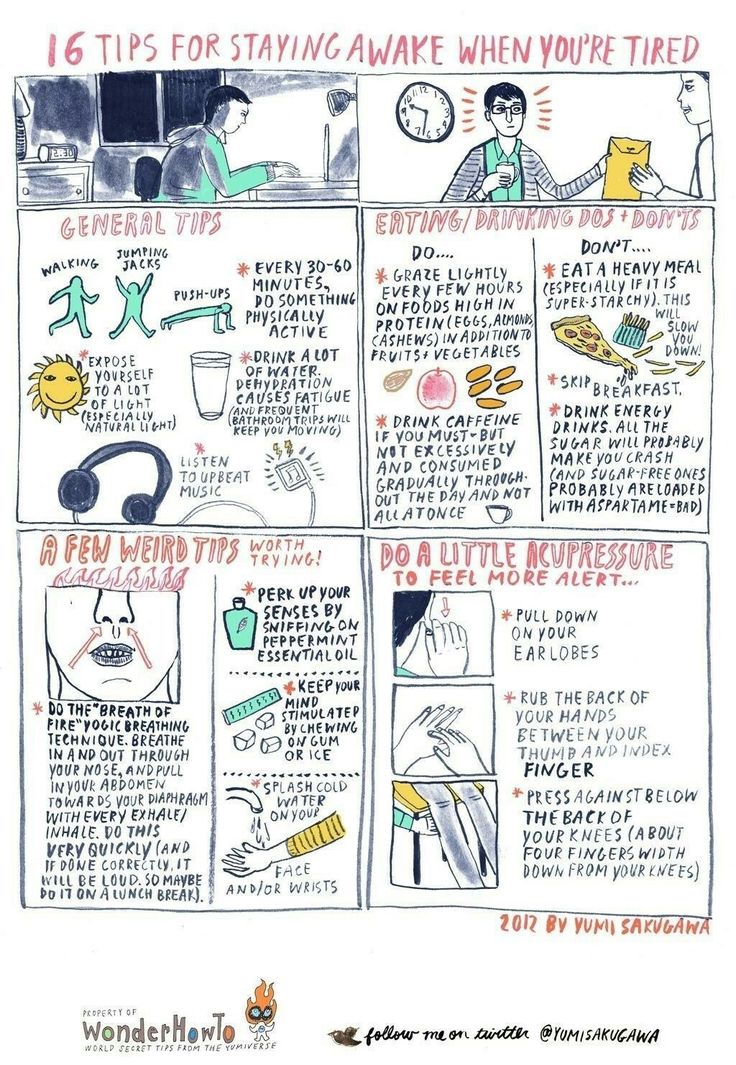
Ksenia Ilchenko
What to eat, drink, how to move to regain vigor after a sleepless night?
Contents of the article
If you have not slept well and feel very tired in the morning, try to exclude dishes containing “fast” carbohydrates from your diet that day. These are carbonated drinks, sweets, pastries, chips, pasta, sugar, honey and other products with a glycemic index of over 55 units. In the body, these carbohydrates quickly turn into sugar and contribute to a sharp release of insulin. A person feels a sudden surge of strength, but soon begins to rapidly lose energy.
Complex carbohydrates, on the other hand, break down slowly. The level of sugar in the blood rises gradually, without sharp jumps, and the person receives an energy reserve that will last for a longer period of time. Incorporate foods containing complex carbohydrates into your daily diet - this will help you last until the next night without falling off your feet from fatigue.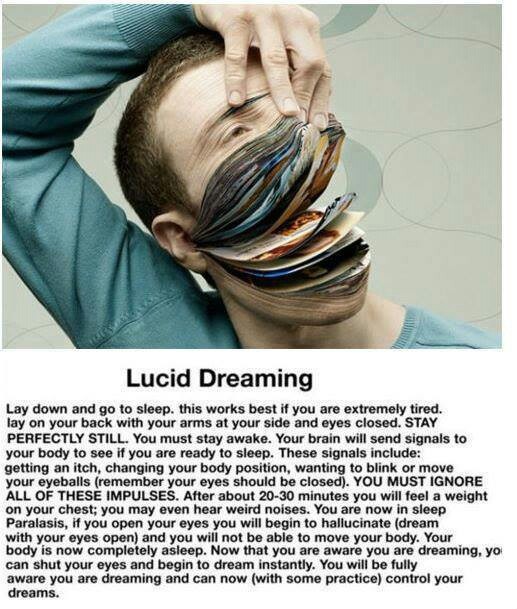
Diet also plays a big role. Try not to eat up, but divide the daily amount of food into 5-6 meals. For a snack, apple, almonds, cashews and dried fruits are good.
If the situation allows, try to move as much as possible - get up from your desk at least every half an hour or an hour. With a long stay in one position (especially sitting), a person begins to feel drowsiness. This is due to a violation of circadian rhythms - natural human biorhythms that determine the sequence of periods of wakefulness and sleep.
If your eyes start to droop, get up and walk around the office, drink a glass of water, and preferably go outside for a few minutes. During your lunch break, take a short walk in the park to oxygenate your body. This will help you feel much more energized.
Fatigue is one of the signs of dehydration. Water helps to maintain tone and energize. If this is exactly what you are missing, try to drink as much clean drinking water as possible - albeit in small volumes, but regularly. In addition, a full bladder will not allow you to sit still - here is an additional movement for you.
Water helps to maintain tone and energize. If this is exactly what you are missing, try to drink as much clean drinking water as possible - albeit in small volumes, but regularly. In addition, a full bladder will not allow you to sit still - here is an additional movement for you.
Do not try to hide from the sun. On the way to the office, walk along the sunny side of the street. At work, part the curtains or raise the blinds to let in as much light as possible into the room. One of the main causes of chronic fatigue among residents of large cities is vitamin D deficiency.
Even 15-20 minutes in the sun is enough to replenish its daily supply and feel a surge of strength. Do not deprive the body of natural energy. Ultraviolet baths are also the prevention of tuberculosis, diabetes, skin, heart and vascular diseases.
Scientists have long proven the effect of smells on the functioning of the nervous system.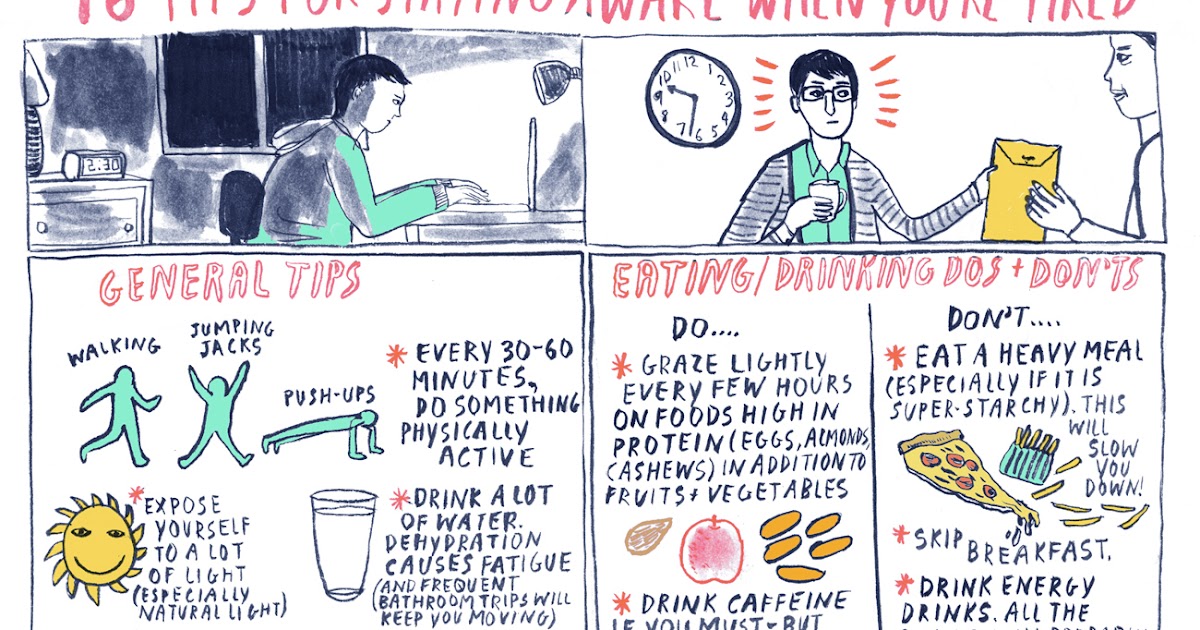 The exact algorithm for the effects of essential oils is unknown, but studies have shown that some of them really relieve fatigue and give a feeling of cheerfulness. These are aromas of citrus (lemon, orange, grapefruit), rosemary, mint, bergamot, black pepper and patchouli. To fill the room with pleasant aromas, use a special lamp or apply a few drops of the product on a cotton swab and place it next to your workplace.
The exact algorithm for the effects of essential oils is unknown, but studies have shown that some of them really relieve fatigue and give a feeling of cheerfulness. These are aromas of citrus (lemon, orange, grapefruit), rosemary, mint, bergamot, black pepper and patchouli. To fill the room with pleasant aromas, use a special lamp or apply a few drops of the product on a cotton swab and place it next to your workplace.
Water invigorates not only when taken orally. Washing hands and face also helps to relieve fatigue and feel cheerful.
If you feel like falling asleep, run your brushes under cold running water or apply a spray of thermal water to your face. You will immediately feel better - and at the same time moisturize your skin.
Use the Breath of Fire technique commonly practiced in yoga.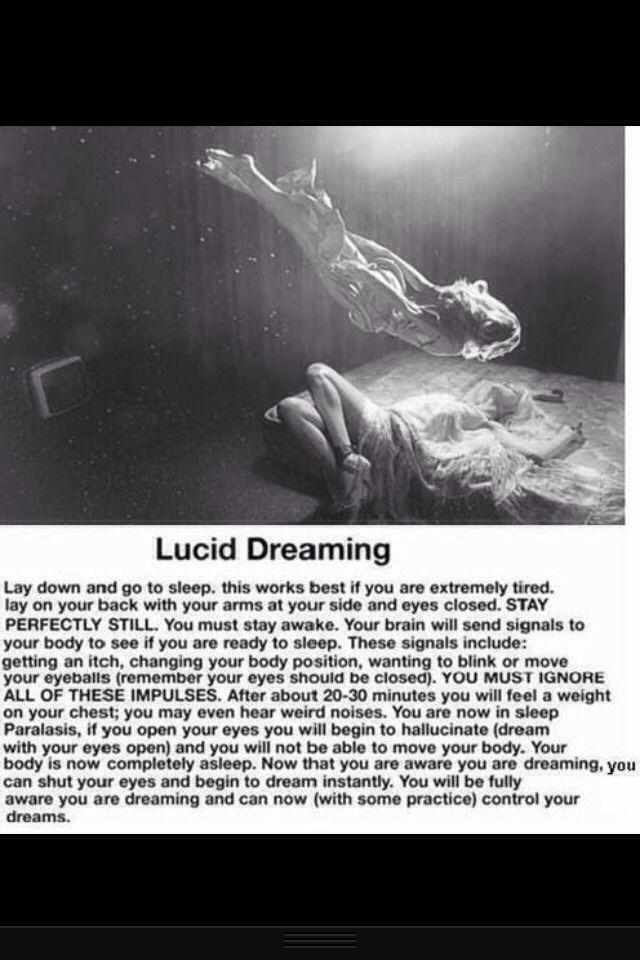 This exercise helps relieve stress, increase lung activity, improve heart function, and regulate blood pressure. The Breath of Fire technique should not be performed during pregnancy and menstruation, with pressure surges and on a full stomach (at least two hours must pass after eating).
This exercise helps relieve stress, increase lung activity, improve heart function, and regulate blood pressure. The Breath of Fire technique should not be performed during pregnancy and menstruation, with pressure surges and on a full stomach (at least two hours must pass after eating).
Sit up straight, close your eyes (otherwise you will feel dizzy) and start breathing in and out through your nostrils. Breathing should be short and sharp. Move your stomach: on exhalation, sharply press it to the ribs, and on inhalation, stick it forward. In this case, the chest should remain as motionless as possible. For starters, 1-2 sets of 10 repetitions are enough. The number of breaths increases gradually as the technique is mastered.
Photo: Getty images
Teamwork
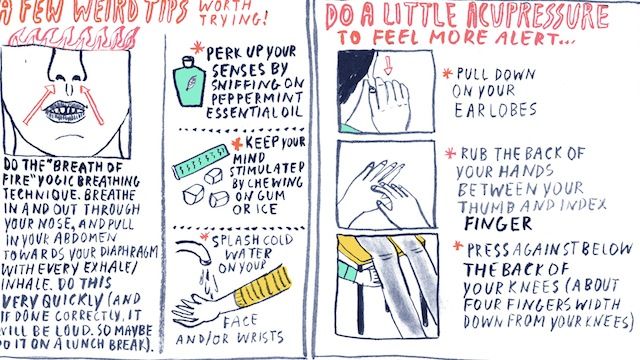 ua will not save you from changing hours, but it will tell you how to cope with drowsiness at work.
ua will not save you from changing hours, but it will tell you how to cope with drowsiness at work. Twice a year, time manipulation disrupts our biorhythms, disturbs our sleep, and causes us to yawn much more than usual at work. And if the autumn turn of the hands gives us an extra hour for sleep, then the transition to daylight saving time makes our bodies get used to earlier rises. As a result, fatigue, irritability and decreased concentration.
The easiest and most familiar way to activate the body is invigorating drinks. Prepare a cup of good coffee the way you like it. Just don't get carried away - it's better to drink coffee no more than three times in 8 hours. And remember that strong green tea invigorates no worse than espresso.
Leave your work area for a few minutes and walk briskly down the hallway or run up and down the stairs. Just a few jumps in place or squats will fill the body with energy and vigor.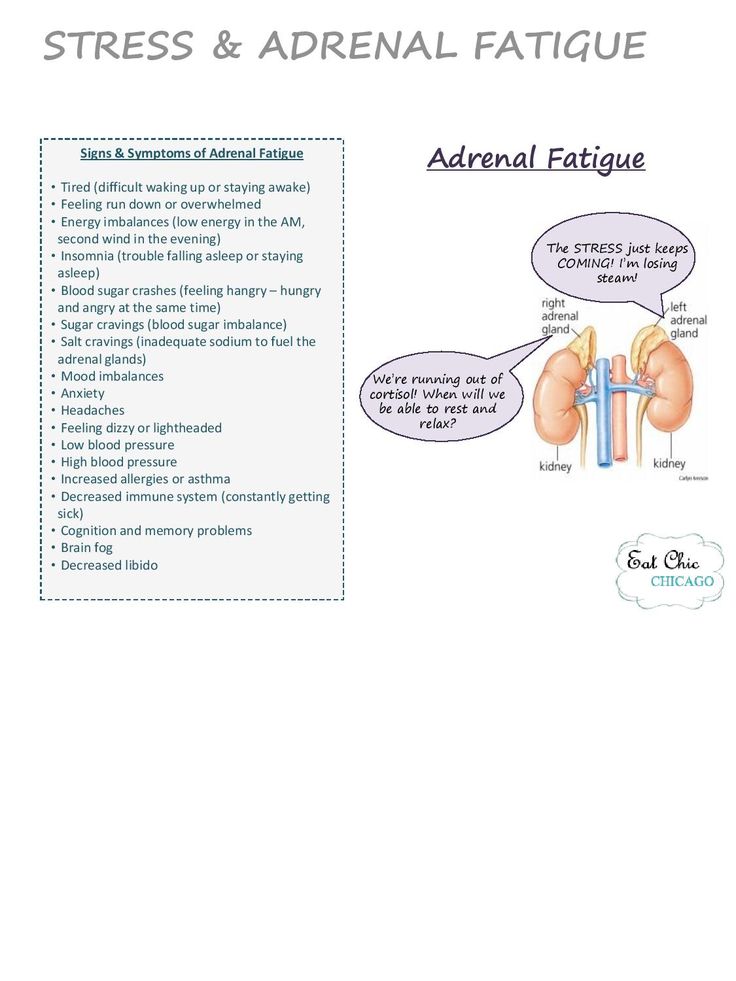 If there is no time for this, warm up on the spot: move your feet, stretch, make a few energetic swings with your arms.
If there is no time for this, warm up on the spot: move your feet, stretch, make a few energetic swings with your arms.
A breath of fresh air is no worse than a sip of fresh coffee. And bright lighting, especially daylight, helps the brain understand that it is time to become more active. Open the blinds and the window, take a few deep breaths, take in the view, or better yet, go outside and walk vigorously back and forth. It’s good if you manage to catch the sun - its light will spur the production of endorphins, and they, in turn, will make you more active and focused.
Eat an orange, tangerine or grapefruit. The aroma of citrus fruits will invigorate the nervous system, and vitamin C will activate the body.
Place your palms under running water. Alternately change cold water to hot and vice versa. A few minutes of such a "shower" - and sleep in one eye.
Do acupressure: rub your hands and massage your fingers from the tips to the base of the palm, press the active points located between the thumb and forefinger.
Stirlitz did everything quickly and efficiently, even rested. The recommendation of a well-known intelligence officer boils down to the formula: 20 minutes of an afternoon nap allows you to get rid of fatigue and not want to sleep during the day. During this time, the brain has time to rest, and the body relaxes and relieves stress.
Whatever one may say, if you want to sleep all the time, you just don't get enough sleep. And you need to change the regime. It's never too late to get good sleep habits. Try to go to bed early tonight and don't take your phone to bed with you.
Follow us on Telegram
You must be logged in to leave a comment.